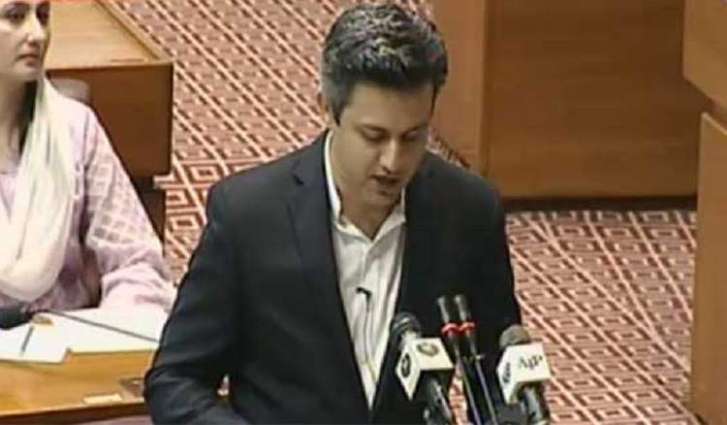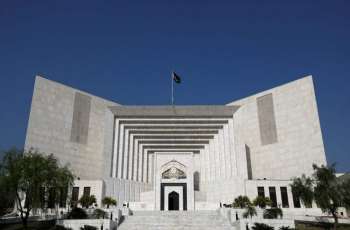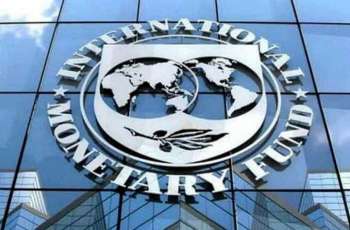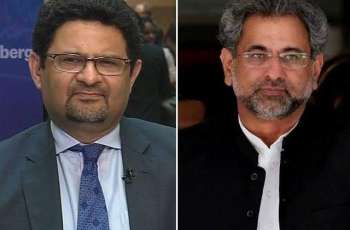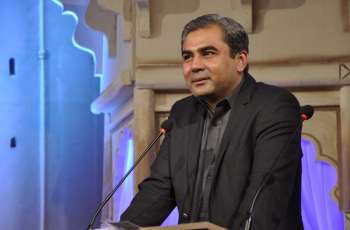Minister of State for Revenue Hammad Azhar has unveiled the first budget for fiscal year 2019-20 of the Pakistan Tehreek-e-Insaf (PTI)-led federal government with an outlay of Rs7.02 trillion, in the National Assembly (NA) in Islamabad on Tuesday
Islamabad (Pakistan Point News / Online - 11th June, 2019) Minister of State for Revenue Hammad Azhar has unveiled the first budget for fiscal year 2019-20 of the Pakistan Tehreek-e-Insaf (PTI)-led federal government with an outlay of Rs7.02 trillion, in the National Assembly (NA) in Islamabad on Tuesday.In his budget speech, the minister said that the governemnt has a brought a new thought, new commitment and new approach to governance. Minister presented the budgetary proposals in the National Assembly this evening.
The resource availability during the next fiscal year has been estimated at 7899.1 billion rupees against 4917.2 billion rupees in the budget estimates of the outgoing fiscal year, he added.He stated that gross revenue receipts are estimated at 6717 billion rupees, showing an increase of 18.7 percent over the budget estimates of outgoing fiscal year.After the share of provinces in gross revenue is transferred, the net review of federal government has been estimated to be about 3463 billion rupees for the next fiscal year.
The provincial share in federal taxes is estimated at 3254.5 billion rupees during the next fiscal year, which is 25.7 percent higher than the budget estimates for the outgoing year, he said.The tax revenue for the next fiscal year is estimated at 5822,160 million rupees, which reflects an increase of 33 percent over revised estimates of the current fiscal year.Out of this, the FBR collection target is 5550 billion rupees, which will be 12 percent of the GDP.
Giving an overview of the economic situation when the PTI government came to power, Minister of State for Finance Hammad Azhar said the country was facing overall debt of 31000 billion rupees including 97 billion dollars of external debt.He stared that foreign exchange reserves had dropped to 10 billion dollars. He said trade deficit was 32 billion dollars while current account deficit touched 20 billion dollars all due to financial mismanagement of the previous government.
He said the government took a number of steps to correct the course of economy. Import duties were increased and imports reduced from 49 billion dollars to 45 billion dollars. Circular debt was reduced by 12 billion rupees per month and it was brought down to 26 billion rupees from 38 billion rupees. He said a programme of 6 billion dollars has been agreed with IMF.This will help us gain 2 to 3 billion dollars loan more at very economical rates.
Oil payment deferred facility from Saudi Arabia will also help reduce pressure on the government, he added.Azhad said we borrowed a total of $9.2 billion from China, Kingdom of Saudi Arabia, and the United Arab Emirates, adding that the government empowered State Bank of Pakistan (SBP)."A total of 11 per cent tax to GDP ratio currently, was the lowest in the region," he said and added there were only 50 percent of SECP registered companies paying tax.
"We will have to change this culture."The minister said that circular debt was reduced by Rs12 billion per month and it was brought down to 26 billion rupees from 38 billion rupees.Given the current economic situation, Hammad Azhar said the government has acted with responsibility and taken steps for the economic stabilization, adding that we have increased import duty which helped us bring down imports from US$49 billion to US$45 billion.
He said remittances have witnessed an increase of US$2 billion, He said the IMF package will also help the country steer the economy towards stability.Azhar went on to say that in Naya Pakistan, the culture of tax evasion will be overcome. Civil and Defense authorities have agreed to voluntary reduced in their budgets. The minister of state said our aim during the financial year 2019-20 will be to increase the tax net.Regretting the low tax to GDP ratio, he said the country cannot make progress without payment of taxes.
He appreciated the gesture of both the civilian government and the military leadership for voluntarily deciding to cut their expenditures.The Asset Declaration Scheme will bring the undeclared assets into mainstream and help increase revenue of the government.In the health sector, the key initiatives to widen the coverage of health care spending and achieve health targets include increase in the number of paramedical staff, expansion of lady health workers programme, strengthening of primary healthcare with backup of skilled personnel including women, medical officers in basic health units, establishment of health emergency surveillance and response system, implementation of a national plan for vaccination and establishing a health information and disease surveillance system.
Micro health insurance schemes will be made part of existing social safety nets to extend health coverage to the vulnerable segments of the society.The government s planned initiatives for employment and skill development during the next year will help alleviate unemployment in the country. The plan focuses to provide and promote technical and vocational training by extending geographical access through the public private partnership in market demand trades.
Federal Budget with a total outlay of 7022 billion rupees for the next fiscal year, containing relief for the poor and measures for economic stabilization and fiscal discipline, has been announced.The provincial share in federal taxes is estimated at 3254.5 billion rupees during the next fiscal year, which is 25.7 percent higher than the budget estimates for the outgoing year.The tax revenue for the next fiscal year is estimated at 5822,160 million rupees, which reflects an increase of 33 percent over revised estimates of the current fiscal year.
The minimum wage has been increased to Rs17,500, Minister for Revenue Hammad Azhar announces as he presents the budget.Azhar also announces that federal government employees from Grade 1-16 will see a pay raise of 10 per cent, whereas those from Grade 17-20 will see a pay raise of 5 pc.Amid thumps of approval, the minister for revenue also declares that the cabinet members will be taking a pay cut of 10 pc in their salaries.Ministry of Science and Technology has been allocated an amount of over 6231 million rupees.
This includes 921 million rupees for ongoing and 5310 million rupees for new projects. The government's planned initiatives for employment and skill development during the next year will help alleviate unemployment in the country, he added.The plan focuses to provide and promote technical and vocational training by extending geographical access through the public private partnership in market demand trades.An amount of five billion rupees, including foreign aid of 2.
4 billion has been allocated for the governance sector in the next fiscal year. Capacity of public sector will be enhanced for improved public service delivery.The budget proposes allocation of 63.5 billion rupees for special areas including merged districts of Khyber Pakhtunkhwa, Azad Jammu and Kashmir and Gilgit-Baltistan.Further, a special allocation for 75 billion rupees will be provided for equitable Regional Development in order to accelerate development of less developed areas and 22 billion rupees are set aside for 10 year development plan of merged districts.
The annual plan aims to improve the capacity of IT sector by enhancing infrastructure facilities, improving skill quality of human resource and accelerating implementation of public E services for citizens.In the upcoming year, special emphasis will be made towards a robust advocacy and awareness campaign for adoption of family planning services and encouraging financing of population sector projects, he added.He stated that Benazir Income Support Project stipend will be increased from Rs5,000 to Rs5,500The government has allocated Rs1,800 billion for development, including Rs950 billion for federal development programs, including water, supply and transmission and distribution of electricity.
The government has allocated Rs45.5 billion for nine development projects in Karachi. The government has contacted foreign investors to run the Pakistan Steel Mills. It also expects to earn around Rs1 billion through mobile phone licenses. The government has allocated Rs152 million for the development and uplift of the newly merged tribal districts in Khyber Pakhtunkhwa.

